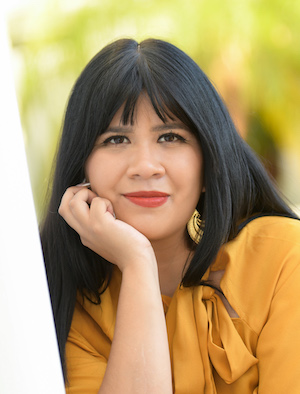The University of California Chancellor’s Postdoctoral Fellowship Program awards fellowships for up to two academic years to exceptional scholars who advance the goals of diversity, equity, and inclusion at the University of California.
What degree did you earn at your previous institution?
Doctor of Philosophy in Ethnic Studies at the University of California, Riverside.
In 2-3 sentences, please tell us about your main research project.
My research investigates the ways in which sexual violence and liberal reforms are utilized, and are central towards ensuring the incarceration of migrants in Immigration Customs Enforcement (ICE) detention centers. Conversely, I demonstrate how women and queer migrants who are incarcerated in ICE immigrant detention centers use notions of “hauntedness” and place-making to unsettle their conditions of captivity. To this end, I read correspondence and hunger strike demands from incarcerated women and queer migrants as a form of embodied feminist abolitionist praxis that counters state sexual violence and carceral violence.
How did you become interested in your main research project?
I grew up living under the fear of ICE raids, migrant detention, and deportation, which pushed me to become active in the immigrant justice movement and a scholar in immigration studies. My upbringing as someone who was raised by a single undocumented mother and whose aunt was in migrant detention motivated me to study the connection between gender, non-citizenship, and state violence.
My research is also informed by years of experience working in the immigrant justice movement as a member of organizations in Los Angeles and the Inland Empire where I have supported migrants in ICE detentions. Through this research, I highlight how detained Black and Latina migrant women actively create liberatory visions that do not exclusively depend on state-centered solutions. This approach illuminates the modes of knowledge and organizing that migrant women produce as methods for survival and change.
What or who inspired you to become a scholar and teacher? Was there a particular experience or person?
The Ethnic Studies courses I took in my undergraduate and graduate career were significant to me since they enabled me to make connections and better understand the conditions of power that affected my family’s life and mine. I am inspired to provide the same transformative education that I received to empower youth from all backgrounds to articulate their experiences and challenge them to create the world where they want to live.
What impact would you like your research to have on the communities with whom you work, your students, academia, and/or society?Through my research, I aim to position migrant communities, migrant women, and queer migrants as sources of knowledge production and theorists of an abolitionist praxis. I aspire to motivate my students to see a world that is not reliant on incarceration, citizenship, and border-making as forms of social value and social organization. Most importantly, I am committed towards maintaining my involvement in community spaces and provide public education that highlights the integral connections between borders, prisons, and sexual violence.
What do you like most about being a scholar and teacher?What I enjoy the most in being a scholar is my role as an author of knowledge that resuscitates traditions of rebellion, defiance, and revolt in communities often left at the margins of academia. What I enjoy the most about being a teacher is having the opportunity to be in conversation with the youth, who will be our future leaders, over issues affecting our society, communities, and world. I feel a great sense of joy and gratitude in witnessing the moments where students’ perspectives on life have transformed and knowing when they feel safe in my classroom to critically engage.
What are you looking forward to doing at UCSC and/or in Santa Cruz?In Santa Cruz I am looking forward to exploring hiking trails and getting to know the beautiful landscapes and the ocean. Moreover, at UCSC, I am ecstatic to join the robust and eclectic group of people who carry the tradition of radical and critical scholarship and to be part of that deep-rooted lineage of liberatory ideas that came out of this campus. I am also looking forward to meeting and working alongside faculty, grad students, undergraduates, and local organizations to advance the conditions of local vibrant migrant communities.

